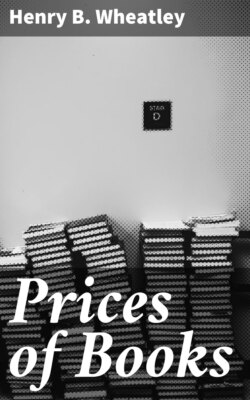Читать книгу Prices of Books - Henry B. Wheatley - Страница 8
CHAPTER III
PRICES OF MANUSCRIPT BOOKS
ОглавлениеIn a treatise devoted to an inquiry concerning the varying prices of books, it is necessary that at least one chapter should be devoted to manuscripts. There is no field of investigation which offers a more interesting subject for study, and few that are more difficult to master. Manuscripts are really more attractive than printed books, because they are so various, and have been produced over a much longer period of the world’s history. It is therefore strange that so few authors care to trouble themselves about them; that this is so may be seen from the large number of readers at the British Museum who are contented to quote over and over again from the much-used printed books, and the comparatively few who cultivate the virgin soil of the Manuscript Department, where there are endless stores of unused materials.
Manuscripts are usually somewhat miscellaneous in character, for they consist (1) of some of the finest examples of the pictorial art of many ages; (2) of the originals of the great works of antiquity; (3) of a large number of valuable works that have never been printed; (4) of charters, documents, letters, memoranda, &c., which are of great value, but which are not books, and therefore do not come within the scope of our present inquiry. In respect to the prices of the manuscripts, it is very difficult to say anything of much value, because (1) many of the most important manuscripts have been transferred from library to library in bulk, and it is comparatively seldom that they come up for public sale; (2) the buyers of manuscripts are fewer than those of printed books, and therefore it is more difficult to arrive at a real standard price for books which are practically unique, as there is no wide public opinion upon the subject. But for the present purpose, a still more important reason why this vast subject cannot be dealt with in a succinct manner is, that the materials for its history have not yet been thoroughly investigated by experts. The relative prices at different periods are hard to understand, even in England, where money has been better regulated than in most countries; but when we have to deal with foreign countries and foreign coins, we are necessarily at a loss how to convert into their present value coins which may have been depreciated at the time we are dealing with, and have certainly been still more depreciated since: for instance, what idea is communicated to the mind of the modern reader when he is told that “Borso d’Este paid forty ducats for a Josephus and a Quintus Curtius, while his large two-volume Bible cost him 1375 sequins”?13
In dealing with manuscripts, it is most important to distinguish between plain and illuminated manuscripts. The neglect of this caution has led to an exaggerated idea of the cost of books before the invention of printing. Instances have been given of purchases at sums equal to a king’s ransom. Hence it is supposed that books were so dear that they were quite out of the reach of any but the richest personages. But this view is erroneous, for we know that by means of the slave labour at Rome and the organised work in the monasteries, plainly written manuscripts could be obtained at a reasonable price. We know now that transcripts of MSS. can be had at a price which, if dear when compared with the price of a newly-published printed book, is by no means extravagant. What could be done at a centre of civilisation like Rome, where books were produced in large numbers and at low prices on account of the organisation of literary production, could be done at other places. There is evidence that at London, and at those seats of learning, Oxford and Cambridge, where caligraphy was a profession, books were not difficult to obtain. Every church and chapel must have had service-books. Probably during the Middle Ages, when travelling was arduous and expensive, persons living in out-of-the-way places had to pay special prices for their literary treasures.
The late Professor J. Henry Middleton referred to this matter of cost in his valuable work on “Illuminated Manuscripts” (1892). After quoting from Aulus Gellius, he wrote—
